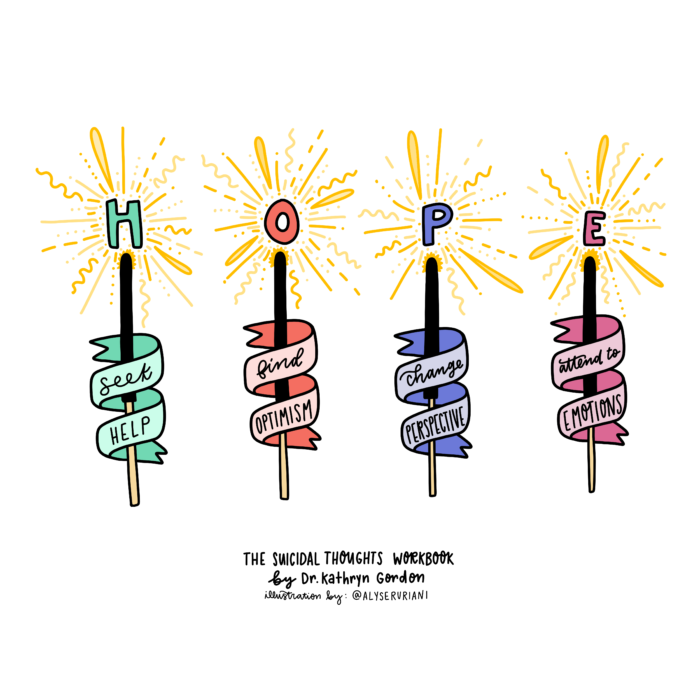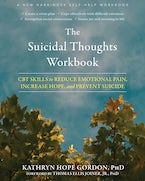By Kathryn Hope Gordon, PhD, author of The Suicidal Thoughts Workbook
An estimated 12 million US adults reported serious suicidal thoughts in 2019. This was before the COVID-19 pandemic, political strife surrounding the election, and increased public awareness of racism-related injustice. These stressors appeared to have driven even higher rates of suicidal thoughts in 2020, especially among unpaid caregivers of adults, essential workers, Hispanic and Black adults, and young adults.
In light of these high levels of distress, it was surprising to learn that preliminary reports point to a decrease in suicides in 2020. How can that be? Optimism about a possible better future may have helped some people to hold on in the face of crises. During 2020, these sparks of hope may have come from a variety of sources, including vaccines on the horizon, stimulus checks, communities and families pulling together in the face of tragedy, greater teletherapy access, and increased participation in activism for a more just world.
True hope comes from societal and community support of our well-being, including housing, nourishment, health care, connection, and meaning. We can also create and highlight hope in our own lives if we know how to look for it. Finding hope is hardest when you’re in a painful place. To support you in troubled times, I created a HOPE acronym describing four strategies to foster hope.
seek Help
If you’re having suicidal thoughts, you may feel like a burden on others. Understandably, this makes it hard to ask for help. Yet, support from others can be crucial to making hardships manageable and not feeling alone as you go through them. Who can you ask for help when you’re feeling hopeless? Some suggestions include family, friends, spiritual and other types of communities, mental health professionals, and helplines. If this list of possibilities seems daunting, try starting with a short list of one to two people or organizations that you will reach out to. List how you will contact them (e.g., email, text, phone), when you will contact them (day/time), and the kind of help you will ask for (e.g., to listen, to problem solve, to spend time with you).
find Optimism
When you’re in pain, a type of cloudiness can take over that makes it hard to see any future bright spots. To find reasons for optimism, try making a list of things you look forward to—no matter how big or small. Do you look forward to coffee in the morning, watching a new movie release, an upcoming trip, or friend’s birthday celebration? These types of future events can strengthen the sense that there is something to look forward to. Another way to build optimism is to look at past struggles you made it through. How did you make it through them? Can you use some of those same strategies again? Are there similar resources that can help you make it through your current struggles?
change Perspective
One theory of hopelessness proposes that we lose hope when we believe negative events are our fault and that they’ll never improve. A shift in perspective can generate hope. Try pushing back against self-blame by looking at all the situational factors that were not in your control. Even if you played some role in the negative event, is there a way to treat yourself with some compassion instead of criticism? Are there reasons to believe that the situation could get better with time? If so, try listing those out to shift to more realistic, hopeful view.
attend to Emotions
Your painful emotions may be communicating a need to you. Sometimes we respond to pain by trying to avoid it, push it away, or talk ourselves out of it. Rather than fighting with your emotions, try taking some time to validate them. Try to understand what you need right now. If you’re lonely, maybe you need to connect with a friend. If you’re drained, you might need some rest. If you’re feeling down, maybe you need an emotional uplift. Attending to your emotions does not require grand gestures. You can find small ways to soothe yourself, boost your mood, and meet your needs. For example, try watching a comedy, stepping outside, cuddling your pet, or doing something creative. These small actions can spark hope during painful times.
Kathryn Hope Gordon, PhD, is a licensed clinical psychologist who specializes in cognitive behavioral therapy (CBT). Prior to working as a therapist, Gordon was a professor for ten years. She is a mental health researcher who has published more than eighty scientific articles and book chapters on suicidal behavior, disordered eating, and related topics. Gordon cohosts the Psychodrama podcast, blogs for Psychology Today, and shares mental health information through her website: www.kathrynhgordon.com.



 2024 Peace Playbook: 3 Tactics to Avoid Clashes with Your Partner
2024 Peace Playbook: 3 Tactics to Avoid Clashes with Your Partner